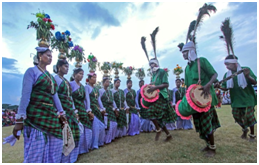

7th January 2023 (6 Topics)
Context
After the Central government assured members of the Jain community that the sanctity of their holy place, Sammed Shikharji on Parasnath hills in Jharkhand will conserve, the members of the Santhal tribe in the State have staked claim to the hill as their Marang Buru (hill deity).
About
Details of the news:
- Recently, the Jharkhand government has decided to cover the Parasnath hills under Tourist spots of the state.
- After this decision, the Jain community across the country has shown discontent as the site belongs as a holy place to them.
- Following the history of the place, it is considered that the Shikharji also known as Sammed Shikharji is a pilgrimage site in Giridih district, Jharkhand.
- It is the most important Jain Tirtha (pilgrimage site) by both Digambara and Shewtambara, for it is the place where twenty of the twenty-four Jain Tirthankaras along with many other monks attained Moksha.
- However, the Santhal community in the state, the Parasnath hills are actually called Marang Buruand have clearly been mentioned in the Gazetteer of undivided Bihar’s Hazaribagh district in 1932, much before it became part of separate Giridih district.
Significance of the Parasnath Hills:
- Parasnath Hills are a range of hills located in the Giridih district of Jharkhand. The highest peak is 1350 metres. It is one of the most important pilgrimage centres for Jains.
- It is located on Parasnath hill, the highest mountain in the state of Jharkhand.
- They call it Sammed Sikhar. The hill is named after Parasnath, the 23rd Tirthankara. Twenty Jain Tirthankaras attained salvation on this hill.
- For each of them, there is a shrine (gumti or tuk) on the hill.
- Some of the temples on the hill are believed to be more than 2,000 years old. However, although the place is habited from ancient times, the temples may be of more recent origin.
- The Santhals call it Marang Buru, the hill of the deity.
- They celebrate a hunting festival on the full moon day in Baisakh (mid-April).

The Santhal Tribes:
- Santhal tribe is the largest tribal community in Jharkhand and has a sizeable population in other States like Bihar, Odisha, Assam and West Bengal.
- The tribe worships nature and over 40 lakh members of the community reside in Jharkhand.
- The Santals are generally non-vegetarian and keep cattle, goats, and poultry.
- Fishing is important whenever they have access to rivers and ponds.
- Traditionally Santals were experts in woodwork and woodcarving, and produced finely carved carts, utensils, and musical instruments, mainly for their own use.
What are the Constitutional Provisions related to the issue?
- 342 of the Constitution of India, the President after consulting with the state governments concerned, has promulgated nine orders so far.
- This promulgation has clearly specified the Scheduled Tribes in relation to concerned State and Union territories. India can proudly be called the largest TRIBAL population in the world.
|
According to the 2001 Census, 8.2% of India's population. This interprets into 82 million people. In all 698 Scheduled Tribes exist in India. Constitutional Provisions / Safeguards for Scheduled Tribes, can be divided into two parts:
|
Basic Safeguards Provided In the Indian Constitution:
- Educational & Cultural Safeguards
- Article 15(4): Special provisions for the advancement of other backward classes (it includes STs
- Article 29: Protection of Interests of Minorities (it includes STs)
- Article 46:The State shall promote, with special care, the educational and economic interests of the weaker sections of the people, and in particular, of the Scheduled Castes, and the Scheduled Tribes, and shall protect them from social injustice and all forms of exploitation.
- Article 350: Right to conserve distinct Language, Script or Culture;
- Article 350: Instruction in Mother Tongue
- Social Safeguard
- Article 23: Prohibition of traffic in human beings and beggars and other similar forms of forced labour;
- Article 24: Forbidding Child Labour.
- Economic Safeguards
- Article 244: Clause(1) Provisions of Fifth Schedule shall apply to the administration & control of the Scheduled Areas and Scheduled Tribes in any State other than the states of Assam, Meghalaya, Mizoram and Tripura which are covered under Sixth Schedule, under Clause (2) of this Article.
- Article 275: Grants in-Aid to specified States (STs&SAs) covered under the Fifth and Sixth Schedules of the Constitution.
- Political Safeguards
- Article 164(1): Provides for Tribal Affairs Ministers in Bihar, MP and Orissa;
- Article 330: Reservation of seats for STs in Lok Sabha;
- Article 337: Reservation of seats for STs in State Legislatures;
- Article 334: 10 years period for reservation (Amended several times to extend the period.);
- Article 243: Reservation of seats in Panchayats.
- Article 371: Special provisions in respect of NE States and Sikkim.

